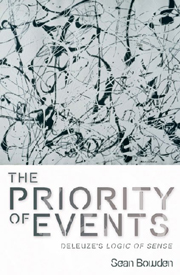Book contents
- Frontmatter
- Contents
- Acknowledgments
- Abbreviations
- Introduction: The Ontological Priority of Events in The Logic of Sense
- 1 The Stoics – Events and Sense
- 2 Leibniz – The Static Ontological and Logical Geneses
- 3 Lautman and Simondon – Problematic Ideas and Singularities
- 4 Structuralism – Structure and the Sense-Event
- 5 Psychoanalysis – Dynamic Genesis
- Conclusion
- Bibliography
- Index
Introduction: The Ontological Priority of Events in The Logic of Sense
Published online by Cambridge University Press: 12 September 2012
- Frontmatter
- Contents
- Acknowledgments
- Abbreviations
- Introduction: The Ontological Priority of Events in The Logic of Sense
- 1 The Stoics – Events and Sense
- 2 Leibniz – The Static Ontological and Logical Geneses
- 3 Lautman and Simondon – Problematic Ideas and Singularities
- 4 Structuralism – Structure and the Sense-Event
- 5 Psychoanalysis – Dynamic Genesis
- Conclusion
- Bibliography
- Index
Summary
The aim of this present study is above all to examine and clarify the complex way in which Deleuze asserts the ontological priority of events over substances in his 1969 work, The Logic of Sense. In particular, the book will analyze the way in which Deleuze grounds this assertion by establishing a relation, the precise nature of which will be seen below, between the works representative of several philosophers and intellectual movements, namely, the Stoics, Leibniz, Albert Lautman, Gilbert Simondon, structuralism and psychoanalysis. In short, it will be shown how Deleuze constructs a concept of the ontologically primitive event by extracting from the work of these thinkers and schools a number of event-related problems and a hybrid family of concepts which, with certain important qualifications, can be said to resolve these problems.
The question naturally arises as to why I have elected to focus on these particular figures and not others. Arguably, The Logic of Sense could profitably be explored in a number of different ways: through Deleuze's readings of Nietzsche and Husserl, for example, or through Lewis Carroll and Antonin Artaud. Indeed, several commentators have noted and analyzed the importance of these latter figures in The Logic of Sense. The fact that they have already done so, of course, is reason enough for not duplicating their efforts. But it is also my belief that Deleuze's philosophy of events is most fruitfully examined in relation to the thinkers chosen for this present study. There are several reasons for holding this belief.
Information
- Type
- Chapter
- Information
- The Priority of EventsDeleuze's Logic of Sense, pp. 1 - 14Publisher: Edinburgh University PressPrint publication year: 2011
